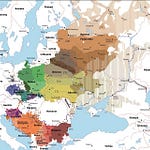On this episode of Unsupervised Learning Razib talks to Matt Welch. He co-founded the Prague-based newspaper Prognosis in the early 1990’s and later worked as an opinion section editor for the Los Angeles Times. From 2008-2016, Welch served as editor-in-chief of Reason magazine, where he currently holds the position of editor-at-large. He co-authored The Declaration of Independents: How Libertarian Politics Can Fix What's Wrong with America and wrote McCain: The Myth of a Maverick. Today, Welch co-hosts The Fifth Column podcast with Kmele Foster and Michael Moynihan.
Razib and Welch first go back to his days in Eastern Europe, and how they shaped his views on foreign policy, making him somewhat heterodox for someone whose primary political inclinations favor libertarianism. Welch discusses how wild, hopeful and chaotic the 1990’s were in the former Eastern Bloc after the fall of the Iron Curtain and the end of Communism. He also argues that these nations had strong historic and contemporary geopolitical reasons to fear the former Soviet Union, and so pushed for the eastward expansion of NATO. Razib makes the Russian case that its turn away from the West in the 2000’s was in response to America’s strategy of encirclement, but Welch dismisses this as Russian revisionism. He believes that at the end of the day Soviet-era elites retained an imperial attitude toward Eastern and Central Europe rooted in a centuries-long assumption of Russian hegemonic status in the region.
Next, retreating from abstruse foreign policy, Razib and Welch discuss the early days of the blogosphere, in 2001/2002. Then, Welch coined the term “warblogger,” and envisaged a scenario where post-partisan citizen-journalists would play an essential role in the information ecosystem of the 21st century. He discusses his disappointment with the reemergence of partisanship within the blogosphere, as well as the disappointments of post-9/11 interventionism. Welch also talks about the Tea Party, and its connection, and ultimate disconnect, from libertarianism. They also discuss how the Tea Party energy was eventually transferred to the ideologically heterodox and often anti-libertarian Trump movement.
Finally, Welch talks about his latest primary venture, the successful The Fifth Column podcast. Razib asks if the current age of podcasting is analogous to the early blogosphere. Welch talks about how organically and gradually The Fifth Column came into being, and the growing pains with greater professionalization. He also addresses their future on The Fifth Column, with a new shift toward video, while continuing the informal and candid nature of the discussions.














